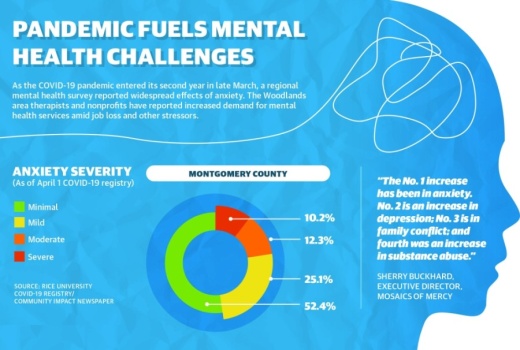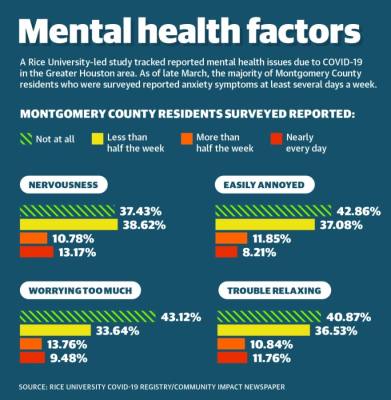Area professionals said while increases in vaccination availability—all Texas adults became eligible March 29—spur optimism, long-lasting effects include psychological trauma.
While Montgomery County unemployment numbers are lower than they were during the 2020 shutdowns, they are still at more than 7%—twice their early 2020 levels, according to the Texas Workforce Commission. Crisis assistance and calls to mental health, suicide and domestic abuse hotlines have also increased, according to several area nonprofits.
Natalie Wilie, who opened her practice Texas Harmony Counseling Center at Market Street in The Woodlands in July, said starting a new practice in the middle of the pandemic presented special challenges. However, the demand was there, she said.
“I’ve seen an increase in people seeking out counseling services because we’re slowly beginning to shed that stigma,” Wilie said.
Regional concern
Montgomery County has seen an overall increase in reported mental health symptoms and more incidents in which crisis intervention is needed, according to several reports.
According to a Rice University-led COVID-19 Registry, a survey gauging local effects of the pandemic, as of April 1, 13.17% of Montgomery County respondents reported experiencing nervousness nearly every day compared to 10.84% and 8.72% in Harris and Fort Bend counties, respectively.
Wayne Mack, Montgomery County Precinct 1 justice of the peace and head of the county’s Behavioral Health and Suicide Prevention Task Force, said there was a 50% uptick in response to crisis calls from 2019-20 in his precinct alone.
“We know there has been a significant increase in people getting services, and what Tri-County [Behavioral Healthcare] has told us is that not only has there been an increase in requests, they have had a tremendous increase in first-time patients,” Mack said.
Within The Woodlands Township, law enforcement reports from 2020 indicate 71 incidents of response to suicide or attempted suicide, up from 65 the previous year.
Evan Roberson, executive director of county-run Tri-County Behavioral Healthcare, said the number of people seeking treatment for anxiety and depression from the center has also increased in the past year.
“We’ve been talking a lot about accumulative stress,” Roberson said. “It’s not just one stress, but a lot of events stack on top of each other, and folks just are not doing real well with stress levels.”
Effects on youth
Although the strain on mental health can be seen across all demographics, the effect is particularly evident among young people, area experts said.
Sean Alexander, a clinical social worker who worked at The Woodlands Springs Behavioral Health Hospital in 2020, said he saw a dramatic increase in needs among adolescents.
“We went from two fully supported teen groups to four, almost a 100% increase,” Alexander said.
Among nonprofits involved with mental health services, local organizations such as Mosaics of Mercy and Yes to Youth also reported a spike in service requests.
Mosaics of Mercy Executive Director Sherry Buckhard said her organization surveyed 51 area counseling providers in Montgomery County, all of which reported an increase in services. Mosaics of Mercy focuses on connecting patients with mental health care providers in the region.
“The No. 1 increase has been in anxiety,” Buckhard said. “No. 2 is an increase in depression; No. 3 is in family conflict; and fourth was an increase in substance abuse.”
Adriana Gutierrez, director of counseling services for Yes to Youth, a nonprofit focusing on crisis counseling for adolescents and their families, said her organization saw a 47% increase in demand for services in 2020 compared to 2019.
Gutierrez said the past year showed the highest number of families on a waiting list for services in her three years there.
“At the moment, we have around 70 families on our waiting list,” Gutierrez said. “When the pandemic first started, we had maybe 30-40 families waiting.”
Economic challenges
Ann Snyder, who has acted as The Woodlands Township’s board of directors liaison with area nonprofits, said economic hardship during the pandemic feeds into the cycle of stress across all socioeconomic levels.
“Without adequate economic resources, families tend to ... have to make difficult choices about food, housing, energy health care,” she said. “I don’t think there’s any distinction; it’s hit everyone.”
In January, the unemployment rate in Montgomery County was 7.5%, more than twice what it was in January 2020, according to the Texas Workforce Commission.
Meanwhile, Montgomery County organizations such as Community Assistance Center saw a 250% increase in services from 2019-20, and Interfaith of The Woodlands, which saw a 43% increase, Snyder said. Both organizations include resources for basic needs such as food and housing.
Along with job loss, lack of health insurance can be an issue for those requiring mental health services.
Mental Health America, a national nonprofit that promotes mental health, reported 20.1% of Texas adults are uninsured compared to the national average of 10.8%.
“[If someone is] dealing with a bipolar episode and they lose employment, the possibility of them losing psychiatric care ... they would be distressed,” Wilie said.
Future expectations and self-careArea mental health professionals said they want to remain cautious moving forward.
“I think we are too soon into [vaccinations] to know exactly how that is going to impact things,” Buckhard said in late March. “With mental health, you have to wait and give it time before you begin to see how people are impacted.”
Gutierrez said she believes people will initially feel better if the pandemic subsides but that trauma catches up over time.
“What I anticipate is going to happen is that things are going to get better for a bit, but we are going to see residual effects like depression and anxiety that will creep up again,” Gutierrez said.
Dr. Jefy Mathew, a Woodlands-based pulmonary critical care physician, said focusing on a healthy sleep cycle can address factors such as stress and fatigue.
“We call it sleep hygiene, and it is incredibly important,” Matthew said. “Sleep is one of the things that if you are thinking about it, the worse your sleep is going to be.”
Mack said the behavioral task force will continue providing resources to the community in case mental health help is needed but noted at this point the damage has already been done.
“People are going to think twice about going out to eat or going out to an entertainment thing,” Mack said. “These are all things that affect people finding joy or purpose. These have all been affected by the pandemic. We have to get to a place where people feel hope again.”
Danica Lloyd contributed to this report.
Here to help
Montgomery County is home to nonprofit organizations that focus on providing mental health services or directing patients to get help.
American Foundation for Suicide Prevention
www.afsp.org
Behavioral Health and Suicide Prevention Task Force
The task force was created in 2019 to provide community resources for those struggling with mental health issues.
www.communityhelp.org
Mosaics of Mercy
The Magnolia-based nonprofit focuses on connecting patients with mental health services across the county.
346-703-0051
www.mosaicsofmercy.com
Tri-County Behavioral Healthcare
The organization provides services for individuals with mental illness, substance use disorders and intellectual/developmental disabilities.
800-550-8408
www.tcbhc.org
Suicide Prevention Lifeline
800-273-8255
www.suicidepreventionlifeline.org
Yes to Youth
The county’s youth services program offers crisis counseling for area families and offers a crisis response team.
888-756-8682
www.sayyestoyouth.org







